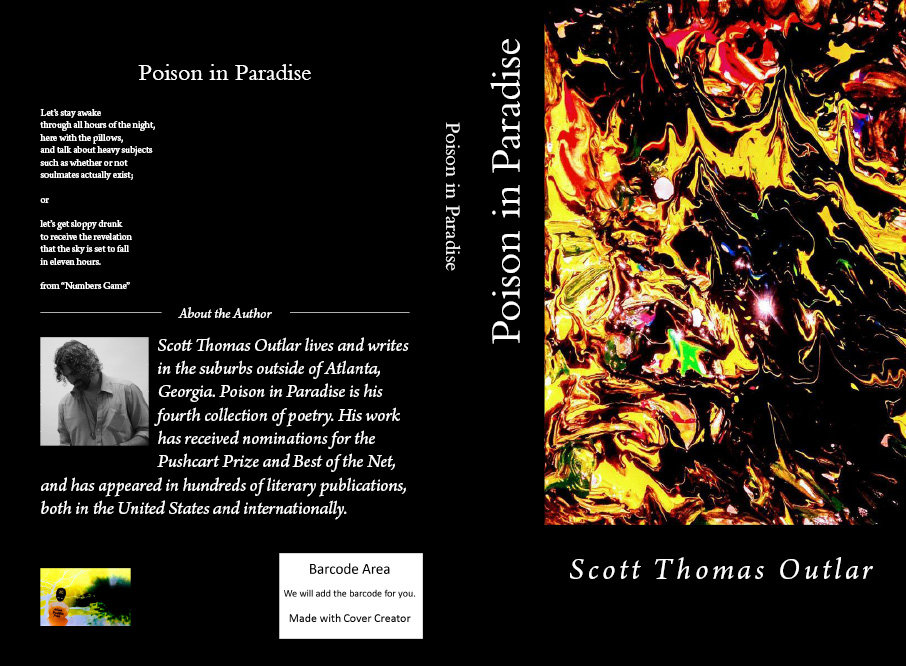Valentin Antonini photo
Sanjeev Sethi interviews Scott Thomas Outlar
In a world of global interconnectedness emails are the public face through which one connects. Scott Thomas Outlar’s emails are: prompt, warm, concise, positive, so much like his poetry. He has just released Poison in Paradise (Alien Buddha Press 2017). Laced with quiet humor, his poems hum with honesty, a sense of awareness sweeps through his poetic voice. No wonder he has been able to create a formidable place for himself in the contemporary poetic scene.
Sanjeev Sethi: A book release is a time to celebrate. How is the emotional state? How do you feel?
Scott Thomas Outlar: First off, I just want to say thank you, Sanjeev, for this opportunity to talk about my work. It’s an honor to be interviewed by such a wonderful poet as yourself.
Yes! All the time, energy, effort, and emotions put into sowing the seeds has now led to this stage of celebration. Poison in Paradise was released in June through Alien Buddha Press after several months of developing drafts of the manuscript back and forth with Red Focks. He, along with the other publisher, Jay Miner, contributed 25 full color photographs taken from around various spots in the United States, and we did our best to align those shots so that they fit thematically with my 67 poems. I am excited about how the project turned out.
SS: Religiosity plays an important part in your poems? Any special reason for this?
STO: Pride cometh before the fall. This ancient bit of wisdom from the Bible, and also reflected in most other spiritual philosophies, is the main theme of the book. As I was growing up, whenever my ego would get too bloated, my father would say to me, “hubris, hubris,” in a playful manner, instilling in me the sense to remain humble. It is advice that I still must keep in mind as an adult. He passed away in 2014, and this book is dedicated to his memory that lives on always.
Allusions to the garden of Eden and the Genesis story are woven through several of the poems in the first half of the book. The second half is about a spiritual rise of ascension after overcoming the fall from grace. It is a testament to the indomitable spirit of humanity.
SS: You don’t play with form as many contemporary poets do? For you the emphasis is on content? Any thoughts on this?
STO: True. My writing is most often focused on getting across the raw emotions of a particular moment. A snapshot in time being captured with words. The lines erupt from my guts like lava spewing from a volcano, and so the free verse form allows for the rhythm to be captured quickly. Later, there is editing, but I always try to crystalize the original burst as best as possible.
SS: The old debate, no one reads poetry: do you agree?
STO: It is not necessarily an art form embraced by the mass public, although music, too, is a type of poetry, and so that is heavily consumed. But I have found that the audience for poetry seems to be steadily growing. Perhaps as the political chaos around the world becomes more turbulent, it leads people in societies to seek out a salve in the form of creative expression. Poetry is close to the soul. As spirits are shaken awake, they are drawn to its healing light. I am also an eternal optimist, so my positive bias might be shining through here.
SS: Does literary criticism help or harm the poetic process?
STO: Given constructively, it can be useful. Poets have egos; this cannot be avoided, and so criticism of their work must be done carefully or else it is liable to be rejected offhand as an insult. The surgery is delicate, and so the most precise blade is required to skillfully maneuver such a process. If the advice is meant to encourage, it will go over. But those who critique only out of jealousy have missed the mark completely.
SS: School for poetry: can poetry be taught? Or is it an acquired art form, honed through years of struggle.
STO: I think there is something to be said for it being a birthright of sorts. Maybe genetic, or just a natural talent. Though any skill will remain dormant unless it is honed and crafted with the utmost care. This is where the teaching can come into play. Some poets have the seed inside, but need help in the process of cultivation. I respect greatly those who have the gift of guiding others to fully illuminate and manifest their potential.
SS: Is there a chasm between MFA poets and the others?
STO: Yes. I believe in many instances this is true. Personally, I find it advantageous to get along well with MFA recipients and “underground” poets alike. I respect any good writer, regardless of circumstance. But I do sense a certain amount of hostility from each side for the other. Institutionalized academia is a closed circuit system; quite simply, it must be this way because that is how it is designed to function. It’s not good or bad, it’s just a natural outcome of hierarchical thinking. Some individuals are able to transcend. Others are forever lost to the belief that taking a course and earning a degree in school will magically grant them creativity or a book contract. In fact, for some, it just might. Who can say? But, in the end, it is not the paper hanging upon a wall that matters most, but what gets written on the blank paper placed in front of one’s eyes that must be splattered with the ink of imagination!
SS: Do you think visibility as on social media is an important part of being a contemporary poet? Where do you weigh in on this?
STO: The idea of using social media, specifically Facebook, once seemed like anathema to my soul. The system felt artificial and designed to trap people inside a virtual fantasy world where they would be separated from reality. Well, these beliefs might have been correct, but I joined up with the Beast anyway. When I began seriously publishing a few years ago, I decided it would be best to take advantage of all available platforms that might prove beneficial. I have to confess that the decision has proven to be crucial in connecting with wonderful writers and artists around the world. A necessary evil, perhaps. There is always the risk of getting caught up scrolling through mindless posts about pointless minutiae. However, admittedly, the occasional funny cat video can serve as a nice way to decompress from work for a while.
SS: You’re handling the editorial responsibilities at three literary journals? Does this come in the way of your creative work?
STO: Trying to balance my personal efforts with those of the various sites I help manage is certainly a good test of mindfulness. Part of my intention is to promote other writers and artists whom I admire, so editorial duties are a labor of love. Sometimes the number of projects going on can become a heavy burden, but I would rather have a bit too much work than not enough. It keeps me on point, and I live by the motto of always taking one step at a time. Although, a hop, skip, jump, and quantum leap forward is never something to turn one’s nose away from.
SS: Poetry makes no money? Does this bother you? How do you manage to balance this issue?
STO: It is a tough road to hoe trying to earn a living as a poet. Part of my rebellious nature demands that I double down on the theory and try to prove that it is actually possible. Doing live performances and selling books at venues is helpful. But I still have a long way to go to reach the ultimate goal. I don’t become discouraged though because I have faith in the fact that honest, hard work is good for the soul, and that eventually the right doors will open that allow for bigger bucks to roll in. As long as I maintain my integrity, I will remain at peace with whatever outcome arises. I do think it is important to diversify one’s energy by having a hand in various different business pursuits. An entrepreneurial spirit will always succeed by continuing to push forward through all challenges.
SS: Literary gossip is agog about you starting a web literary journal? True?
STO: Indeed! I am excited to launch a new journal called Happy Hour Hallelujah that will be dedicated to poetry, prose, photography, and art of all kinds. It is the next step toward what will eventually become a press that publishes anthologies, chapbooks, and full-length collections. I have big plans lined up for 2018 and beyond…
Poison in Paradise is published by Alien Buddha Press
Sanjeev Sethi
Sanjeev Sethi is the author of three well-received books of poetry. His most recent collection is This Summer and That Summer (Bloomsbury, 2015). His poems are in venues around the world: Empty Mirror, Olentangy Review, Grey Sparrow Journal, Peacock Journal, Modern Poets Magazine, Faith Hope & Fiction, New Mystics, Yellow Mama, Serving House Journal, The Penwood Review, Boston Accent Lit, Soul-Lit, London Grip, 3:AM Magazine, With Painted Words, and elsewhere. He lives in Mumbai, India.
Scott Thomas Outlar
Scott Thomas Outlar hosts the site 17Numa.wordpress.com where links to his published poetry, fiction, essays, interviews, and books can be found. He recently received three Pushcart Prize nominations for his work in 2016. Scott is a member of The Southern Collective Experience. He serves as an editor for Walking Is Still Honest Press, The Blue Mountain Review, Novelmasters, and The Peregrine Muse.





No Comments Yet!
You can be first to comment this post!